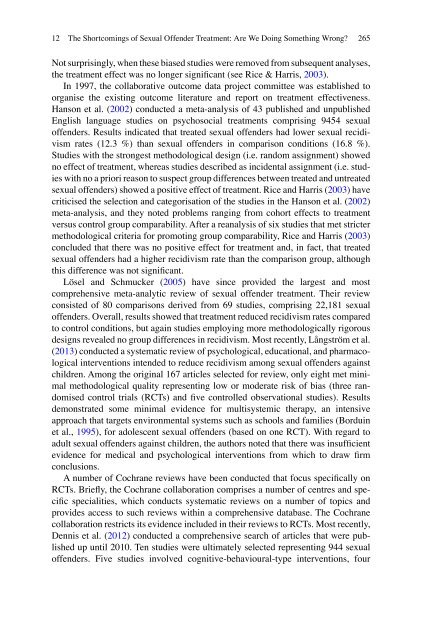Treatment of Sex Offenders
RvRk1r
RvRk1r
You also want an ePaper? Increase the reach of your titles
YUMPU automatically turns print PDFs into web optimized ePapers that Google loves.
12 The Shortcomings <strong>of</strong> <strong>Sex</strong>ual Offender <strong>Treatment</strong>: Are We Doing Something Wrong?<br />
265<br />
Not surprisingly, when these biased studies were removed from subsequent analyses,<br />
the treatment effect was no longer significant (see Rice & Harris, 2003 ).<br />
In 1997, the collaborative outcome data project committee was established to<br />
organise the existing outcome literature and report on treatment effectiveness.<br />
Hanson et al. ( 2002 ) conducted a meta-analysis <strong>of</strong> 43 published and unpublished<br />
English language studies on psychosocial treatments comprising 9454 sexual<br />
<strong>of</strong>fenders. Results indicated that treated sexual <strong>of</strong>fenders had lower sexual recidivism<br />
rates (12.3 %) than sexual <strong>of</strong>fenders in comparison conditions (16.8 %).<br />
Studies with the strongest methodological design (i.e. random assignment) showed<br />
no effect <strong>of</strong> treatment, whereas studies described as incidental assignment (i.e. studies<br />
with no a priori reason to suspect group differences between treated and untreated<br />
sexual <strong>of</strong>fenders) showed a positive effect <strong>of</strong> treatment. Rice and Harris ( 2003 ) have<br />
criticised the selection and categorisation <strong>of</strong> the studies in the Hanson et al. ( 2002 )<br />
meta-analysis, and they noted problems ranging from cohort effects to treatment<br />
versus control group comparability. After a reanalysis <strong>of</strong> six studies that met stricter<br />
methodological criteria for promoting group comparability, Rice and Harris ( 2003 )<br />
concluded that there was no positive effect for treatment and, in fact, that treated<br />
sexual <strong>of</strong>fenders had a higher recidivism rate than the comparison group, although<br />
this difference was not significant.<br />
Lösel and Schmucker ( 2005 ) have since provided the largest and most<br />
comprehensive meta-analytic review <strong>of</strong> sexual <strong>of</strong>fender treatment. Their review<br />
consisted <strong>of</strong> 80 comparisons derived from 69 studies, comprising 22,181 sexual<br />
<strong>of</strong>fenders. Overall, results showed that treatment reduced recidivism rates compared<br />
to control conditions, but again studies employing more methodologically rigorous<br />
designs revealed no group differences in recidivism. Most recently, Långström et al.<br />
( 2013 ) conducted a systematic review <strong>of</strong> psychological, educational, and pharmacological<br />
interventions intended to reduce recidivism among sexual <strong>of</strong>fenders against<br />
children. Among the original 167 articles selected for review, only eight met minimal<br />
methodological quality representing low or moderate risk <strong>of</strong> bias (three randomised<br />
control trials (RCTs) and five controlled observational studies). Results<br />
demonstrated some minimal evidence for multisystemic therapy, an intensive<br />
approach that targets environmental systems such as schools and families (Borduin<br />
et al., 1995 ), for adolescent sexual <strong>of</strong>fenders (based on one RCT). With regard to<br />
adult sexual <strong>of</strong>fenders against children, the authors noted that there was insufficient<br />
evidence for medical and psychological interventions from which to draw firm<br />
conclusions.<br />
A number <strong>of</strong> Cochrane reviews have been conducted that focus specifically on<br />
RCTs. Briefly, the Cochrane collaboration comprises a number <strong>of</strong> centres and specific<br />
specialities, which conducts systematic reviews on a number <strong>of</strong> topics and<br />
provides access to such reviews within a comprehensive database. The Cochrane<br />
collaboration restricts its evidence included in their reviews to RCTs. Most recently,<br />
Dennis et al. ( 2012 ) conducted a comprehensive search <strong>of</strong> articles that were published<br />
up until 2010. Ten studies were ultimately selected representing 944 sexual<br />
<strong>of</strong>fenders. Five studies involved cognitive-behavioural-type interventions, four



